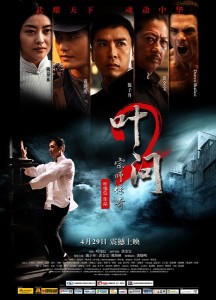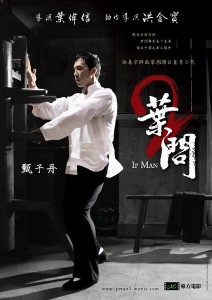Ip Man 2
叶问2
Hong Kong/China, 2010, colour, 2.35:1, 108 mins.
Director: Ye Weixin 叶伟信 [Wilson Yip].
Rating: 9/10.
Beautifully crafted, absorbing sequel to the terrific first film – and this time with a top-form Hong Jinbao [Sammo Hung] as well.
Hong Kong, 1950. After escaping from Foshan, China, following his humiliation of the Japanese during the war, penniless Yong Chun [Wing Chun] master Ye Wen [Ip Man], with his pregnant wife Zhang Yongcheng (Xiong Dailin) and young son (Li Ze), has opened a rudimentary martial arts school with the help of his friend, newspaper editor Leung Gen (Ao Jianian). However, the local economy is poor and his new pupils, led by restless Huang Liang (Huang Xiaoming), cannot afford to pay much. When Huang Liang loses a street fight against Zheng Weiji (Du Yuhang), a pupil from the Hong Chun school, Ye Wen ends up apologising to the school’s veteran master, Hong Zhennan (Hong Jinbao), who tells Ye  Wen he has to prove himself in combat to be allowed to establish his own school. Meanwhile, racist Royal HK Police superintendent Wallace (Charlie Mayer), twisting the arm of Chinese cop Fatso (Zheng Zeshi), organises a western vs eastern boxing tournament, supposedly to placate anti-British feeling in the colony but actually to further humiliate the Chinese and their martial arts.
Wen he has to prove himself in combat to be allowed to establish his own school. Meanwhile, racist Royal HK Police superintendent Wallace (Charlie Mayer), twisting the arm of Chinese cop Fatso (Zheng Zeshi), organises a western vs eastern boxing tournament, supposedly to placate anti-British feeling in the colony but actually to further humiliate the Chinese and their martial arts.
REVIEW
It was almost too much to hope that the sequel would measure up to the 2008 original, which gave Zhen Zidan 甄子丹 [Donnie Yen] the role of his career. But with the same team back, apart from a change of d.p., Ip Man 2 叶问2 is actually even better. Hong Kong director Ye Weixin 叶伟信 [Wilson Yip] and scriptwriter Huang Zihuan 黄子桓 [Edmond Wong] still consciously evoke the territory’s classic martial arts films of the 1960s and early 1970s, with a rival-schools story, plenty of stoic Chinese nationalism and overdrawn racist villains (here British instead of Japanese), and character expressed via cleanly filmed fights, superbly choreographed in purist style by Hong Jinbao 洪金宝 [Sammo Hung]. But relieved of the burden of having to introduce their hero and detail the Sino-Japanese War background, they’ve also finessed a better flowing narrative. The icing on the cake is the widescreen cinematography by Pan Hengsheng 潘恒生 [Poon Hang-sang], much smoother and more subtly textured than that by the less experienced Ke Xingpei 柯星沛 [O Sing-pui] for the first film. While seemingly simple, Pan’s camerawork extracts the most from the period production design by Mai Guoqiang 麦国强 [Kenneth Mak] and costumes by Li Bijun 利碧君 [Lee Pik-kwan], both of which uncannily recall Hong Kong studio productions from 40 or so years ago.
Zhen is once again superb in the title role, mixing an ascetic calm and righteousness with impressively contained fighting skills, and yields no screen space even to Hong, who stirs some wry comedy into his arrogant but secretly sickly rival master with a family as big as his waistline. Though Zhen and Hong’s characters start out as rivals, you just know they’re going to end up teaming vs the evil British cop and his imported champion boxer, and that Chinese ethics and martial arts are going to triumph. But the journey to that point is still utterly engrossing, with one after another classic fight sequence (in Guanyong [Kwun Chung] fish market; on a wobbly table; twice in a boxing ring) marking the way.
The only blemishes are the reprise by Ren Dahua 任达华 [Simon Yam] of his original role, but this time as a brain-damaged tramp, and the under-use of the character Jin Shanzhao played by Fan Shaohuang 樊少皇 [Louis Fan], one of the liveliest in the first film. Ren’s role, in fact, should have been cut out entirely, as the few scenes simply hold up the story for no dividends. As Ye Wen’s [Ip Man’s] newly-pregnant wife, Mainland actress Xiong Dailin 熊黛林 is little more than window-dressing in this one, but other roles are well cast, with Mainland poster boy Huang Xiaoming 黄晓明 looking like he was directly transported from a ’70s Golden Harvest movie as Ye Wen’s over-eager student.
With Ip Man-ia in full swing – a prequel, The Legend Is Born: Ip Man 叶问前传, by Qiu Litao 邱礼涛 [Herman Yau], due in June, and The Grandmaster 一代宗师, by Wang Jiawei 王家卫 [Wong Kar-wai], later this year [in the event, not until early 2013] – there will be huge pressure on Zhen, Ye and Huang to maintain this level of quality in the inevitable Ip Man 3, detailing the Li Xiaolong 李小龙 [Bruce Lee] years.
[In China the handle 宗师传奇 (“legend of the master”) was added to the title.]
CREDITS
Presented by Mandarin Films (HK), Henan Film & TV Production Group (CN), Beijing Shengshi Huarui Film Investment & Management (CN), Desen International Media (Beijing) (CN). Produced by Mandarin Films (HK).
Script: Huang Zihuan [Edmond Wong]. Photography: Pan Hengsheng [Poon Hang-sang]. Editing: Zhang Jiahui [Cheung Ka-fai]. Music: Kawai Kenji. Production design: Mai Guoqiang [Kenneth Mak]. Costume design: Li Bijun [Lee Pik-kwan]. Sound: Wang Jie, Mo Jiajia. Action: Hong Jinbao [Sammo Hung]. Yong Chun advice: Ye Zhun [Yip Chun]. Visual effects: Huang Zhiheng [Henri Wong].
Cast: Zhen Zidan [Donnie Yen] (Ye Wen), Hong Jinbao [Sammo Hung] (Hong Zhennan, master), Huang Xiaoming (Huang Liang), Xiong Dailin (Zhang Yongcheng, Ye Wen’s wife), Zheng Zeshi [Kent Cheng] (Fei Bo/Fatso, policeman), Ao Jianian (Liang Gen, editor), Ren Dahua [Simon Yam] (Zhou Qingquan), Zheng Jiaxing (Zhou Guangyao, Zhou Qingquan’s son), Fan Shaohuang [Louis Fan] (Jin Shanzhao), Du Yuhang (Zheng Weiji, Hong Zhennan’s senior pupil), Darren Shahlavi (Taylor Miller/Twister), Shi Xiaolong (Xu Shichang), Li Ze (Ye Zhun, Ye Wen’s son), Jiang Daiyan (young Li Xiaolong), Luo Mang (Luo, master), Feng Ke’an (Master Zheng), Lin Keming (Lin, master), Charlie Mayer (Wallace, police superintendant), Li Huiying (San Gu), Ma Zengmeng (landlady), Lu Meifang (Hong Zhennan’s wife), Tian Rui (Jin Shanzhao’s wife), Stefan Morawietz (Twister’s coach), Brian Thomas Burrell (MC), Tomer Oz (fight referee).
Release: China, 27 Apr 2010; Hong Kong, 29 Apr 2010.
(Review originally published on Film Business Asia, 27 May 2010.)
